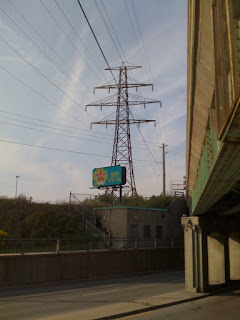I wrote about Death Bonds back in May of this year. No, I didn't break the story or anything like that. However, I did perform the analysis ahead of everyone else. The New York Times recently did the analysis too, and came up with the same conclusions as me, which is reassuring and disturbing at the same time.
These are direct quotes from the Times article:
"And investors are not interested in healthy people’s policies because they would have to pay those premiums for too long, reducing profits on the investment."
"In addition to fraud, there is another potential risk for investors: that some people could live far longer than expected."
This is gonna be dirty. Wall Street is primed to make large bets on our elderly dying. They would prefer to cherry-pick policies from cash-starved unhealthy seniors, because that's where the money's at.
That doesn't worry me.
The article also mentions the practice of rigging bids for these policies. Imagine a recently laid-off father trying to make mortgage payments by selling of his insurance policy to bridge the uncertainty between jobs. With the life settlement market being so new, it's actually quite easy for colluding brokers to deceive him about the true market value of his policy. It's already happening.
But I'm still not bothered.
What about "stranger-owned life insurance," the practice where Wall Street firms wine-and-dine people to take out life insurance and then promptly transfer the policy over to these firms?
That's blatant manipulation, but whatever.
What kills me is that securitizing life settlements into death bonds is remarkably similar to what Wall Street was doing with mortgages, and we all know how that went. It's obviously a lucrative business to sell industrial sized securities, but there hasn't been any regulatory change to protect investors from poorly composed assets, nor have they modified the incentive schemes, which means much like mortgage backed securities, it's more important to make the sale even when you're selling shit.
The big underlying assumption this time is that people will die. Last time around it was about how housing prices will continue to rise in the long run. Make no mistake - both are true. It's just when we collectively get so involved in one particular market, not only does the assumption have to hold true, but it has to unravel in exactly the way we all expect it to.
I was arguing this point with my father and he told me to relax. He said insurance companies were in the business of making these calculations. You can rest assured that every single day they calculate how much they will have to pay out in future claims. It's their job to be prepared for these payouts.
But whether the insurance companies like it or not, they are slowly being pushed out of insurance and into betting against Wall Street. They don't have a choice in making these bets, which is what I find so strange. What initially starts out as an honest insurance arrangement with a family man, transforms into an investment for a Wall Street bank, but insurance was never meant to be an investment. Instead of people canceling policies when they no longer need to be insured (eliminating the claim altogether), they now have the option to cash them in for a higher value to a third party who is willing to wait for death to collect that ultimate payout.
As the death bond market emerges, it will test the resolve of American insurance companies unnecessarily for the sake of Wall Street profiteering. If you think it's really no big concern to the reserves and liquidity of insurance companies, that's fine. Only time will tell. As far as I'm concerned, the larger the death bond market becomes, the greater chance there is that insurance companies will face detrimental cash flow issues once people start dying.
But if we dig deeper, the real problem doesn't have to do with death bonds, or insurance, or any specific financial instrument. What is troubling is how much wealth is being transferred from the average American to the banks. In America, it's far too easy to take one person's financial problem and shove it into another person's pension plan. Clearly, lines need to be drawn.
Take pride in being a Canadian. Our nation has always been very strict with money managers. For our retirement plans, pensions and other savings, the banks can't just do whatever they want with it. They are permitted only a limited amount of risk, and many of the exotic financial products that have become so popular over the last ten years are completely out of the question. This is a good example (search "Canada's Foreign Property Rule" if you are interested).
This weekend, we should be thankful that our financial forefathers were ultra-conservative prudes. We should honour them because they were absolutely right to be so tight-assed with financial regulations. Their lameness is why Canadians have been able to preserve their wealth, relative to Americans. This fact, along with all the turkey you will eat this weekend, should secure you a good night's rest.
These are direct quotes from the Times article:
"And investors are not interested in healthy people’s policies because they would have to pay those premiums for too long, reducing profits on the investment."
"In addition to fraud, there is another potential risk for investors: that some people could live far longer than expected."
This is gonna be dirty. Wall Street is primed to make large bets on our elderly dying. They would prefer to cherry-pick policies from cash-starved unhealthy seniors, because that's where the money's at.
That doesn't worry me.
The article also mentions the practice of rigging bids for these policies. Imagine a recently laid-off father trying to make mortgage payments by selling of his insurance policy to bridge the uncertainty between jobs. With the life settlement market being so new, it's actually quite easy for colluding brokers to deceive him about the true market value of his policy. It's already happening.
But I'm still not bothered.
What about "stranger-owned life insurance," the practice where Wall Street firms wine-and-dine people to take out life insurance and then promptly transfer the policy over to these firms?
That's blatant manipulation, but whatever.
What kills me is that securitizing life settlements into death bonds is remarkably similar to what Wall Street was doing with mortgages, and we all know how that went. It's obviously a lucrative business to sell industrial sized securities, but there hasn't been any regulatory change to protect investors from poorly composed assets, nor have they modified the incentive schemes, which means much like mortgage backed securities, it's more important to make the sale even when you're selling shit.
The big underlying assumption this time is that people will die. Last time around it was about how housing prices will continue to rise in the long run. Make no mistake - both are true. It's just when we collectively get so involved in one particular market, not only does the assumption have to hold true, but it has to unravel in exactly the way we all expect it to.
I was arguing this point with my father and he told me to relax. He said insurance companies were in the business of making these calculations. You can rest assured that every single day they calculate how much they will have to pay out in future claims. It's their job to be prepared for these payouts.
But whether the insurance companies like it or not, they are slowly being pushed out of insurance and into betting against Wall Street. They don't have a choice in making these bets, which is what I find so strange. What initially starts out as an honest insurance arrangement with a family man, transforms into an investment for a Wall Street bank, but insurance was never meant to be an investment. Instead of people canceling policies when they no longer need to be insured (eliminating the claim altogether), they now have the option to cash them in for a higher value to a third party who is willing to wait for death to collect that ultimate payout.
As the death bond market emerges, it will test the resolve of American insurance companies unnecessarily for the sake of Wall Street profiteering. If you think it's really no big concern to the reserves and liquidity of insurance companies, that's fine. Only time will tell. As far as I'm concerned, the larger the death bond market becomes, the greater chance there is that insurance companies will face detrimental cash flow issues once people start dying.
But if we dig deeper, the real problem doesn't have to do with death bonds, or insurance, or any specific financial instrument. What is troubling is how much wealth is being transferred from the average American to the banks. In America, it's far too easy to take one person's financial problem and shove it into another person's pension plan. Clearly, lines need to be drawn.
Take pride in being a Canadian. Our nation has always been very strict with money managers. For our retirement plans, pensions and other savings, the banks can't just do whatever they want with it. They are permitted only a limited amount of risk, and many of the exotic financial products that have become so popular over the last ten years are completely out of the question. This is a good example (search "Canada's Foreign Property Rule" if you are interested).
This weekend, we should be thankful that our financial forefathers were ultra-conservative prudes. We should honour them because they were absolutely right to be so tight-assed with financial regulations. Their lameness is why Canadians have been able to preserve their wealth, relative to Americans. This fact, along with all the turkey you will eat this weekend, should secure you a good night's rest.



















